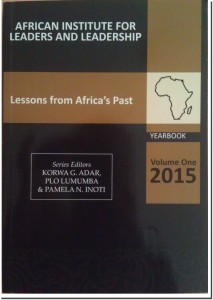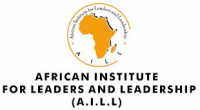REPORT ON THE LAUNCH OF THE AFRICAN LEADERS AND LEADERSHIP YEARBOOK, ON 25TH JUNE 2015
The African Institute for Leaders and Leadership (AILL) launched its first flagship project, Volume One of the African Institute for Leaders and Leadership Yearbook: Lessons from Africa’s Past (2015) on 25th June, 2015. The event was planned to kick off at 1730 hours and end at 2000 hours, with an expectation of a good and balanced attendance.
Arrival and Registration
Upon their arrival, at the Amani Hall, each guest signed the AILL Guest Book with their name, company/organization, as well as brief first impression comment. Thereafter, each guest was issued with a conference name-tag, a brochure containing the African Leaders and Leadership Yearbook (AILLY) concept note, the program of the AILLY launch, and most importantly, a copy of the AILLY.
The Start of the Event
The cocktail launch was called to order at 1815 hours, after the arrival of invited guests. The Master of Ceremony (MC), Mr. Barrack Muluka, then invited the Chair of AILL Board of Trustees, Prof. Korwa Gombe Adar to give a welcoming note. Prof. Adar opened the ceremony by welcoming the guests and extended AILL’s appreciation for the guests’ attendance.
 Speeches
Speeches
After welcoming the guests, Prof. Adar gave a captivating speech principally touching on the concept of sovereignty, its derivation, applicability within an African context and challenges. He further elaborated on the issues of Africa’s leadership and the contribution of the AILLY in filling the demonstrable gaps in the realm of Africa’s leadership.
The MC then invited H.E. John Moreti, the Botswana High Commissioner to Kenya, to give the Keynote Address. Ambassador Moreti walked the audience through the challenges besetting Africa’s leadership, reiterating its significance in setting the stage for the rejuvenation of Africa’s leadership. He also noted that Africa should learn from experiences and share best practices through effective communication. He cited the AILLY as an imperative source aiming at instigating a debate on Africa’s leadership. He observed that the significance of the AILLY should not be downplayed.
Thereafter, the MC invited AILL’s Managing Trustee, Prof. PLO Lumumba to give a speech. Prof. Lumumba introduced his speech from a philosophical standpoint, giving the African analogy of leadership. He noted that Africa’s development is dependent on good and visionary leadership from all quarters: political; religious; civil society; and juridical. He lamented that bad leadership is responsible for dragging Africa’s development journey, and challenged Africans to cease the opportunity and restore Africa’s pride, as espoused by the principals underpinning the African liberation struggle.
At 2100 hours, Prof, Lumumba gave a vote of thanks. The MC then called the event to a close.
Audience responses
During the speeches, the audience responded to the speakers by giving applauses, as a sign of appreciating the contribution of the speakers. As well, the speakers and the audience interacted by sharing light moments through laughter. Additionally, the speakers and the audience showed a symbiotic appreciation depicted in the numerous photo-oped requests by the attendees to the speakers, and the speakers’ signing of the AILLY copies for the audience.
Organization of the Event
The cocktail launch was well-organized by the AILL team consisting of the Board of Trustees: Prof. Korwa Gombe Adar; Prof. PLO Lumumba; and Pamela Inoti, and the AILL officers: June Gichuki; and Jim Okore.
An ad-hoc “secretariat” was also put in place consisting of four ladies. The four ladies were stationed at the registration desk and charged with the responsibility of registering guests, issuing conference name-tags, AILLY concept note, the program of the AILLY launch and copies of the yearbook.
At the Amani Hall, Serena attendants diligently served guests with drinks and barbecue.
Media coverage
The launch of the AILLY was captured by the Kenya Broadcasting Corporation (KBC) from the beginning to the end. AILL also procured the services of professional photographers for the event.
Challenges, Lessons Learned and Recommendations
Even tough enough invitations were sent, some invites were dispatched very late, thereby giving invitees a hard time to prepare to attend the event. In the next events, AILL should constitute a comprehensive list of probable attendees well in advance (at least three weeks in advance). The Keynote speaker should be approached at least one month in advance in order to make him/her prepare his/her speech well in time.
Furthermore, AILL invitations, in future, should be well balanced in terms of a fair representation of sectors: political; civil society; religious, academia; and diplomatic community.
A plan should be put in place, well in advance, to ensure that media coverage of AILL events is much wider. The general public deserves to learn about the AILL activities and events through the media. Here, key media personalities should be contacted well in advance, and added in AILL’s mailing list. Future AILL events should be covered by at least four mainstream media houses.
AILL should come up with a mechanism of ensuring a reasonable distribution of its publications. For example, the launch registered 76 attendees yet 200 copies of the AILL were picked during this day. This variance is astronomical. Perhaps, in future, the “Secretariat” should arrange AILL’s publications such that each conference name-tag to have a complete package of the brochure containing the concept note, program and a copy of the publication. This will curb the problem of issuing multiple of copies to guests.

